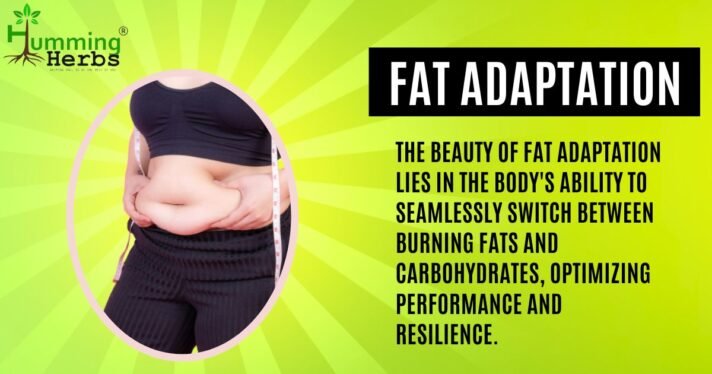- Your cart is empty
- Continue shopping

Introduction: In the quest for health and fitness, the traditional approach has often been to focus on weight loss, primarily through calorie restriction and exercise. However, emerging research suggests that enhancing fat metabolism might be a more effective and sustainable strategy. This article delves into the benefits of focusing on fat metabolism and how certain herbs like berberine, red yeast rice, and cinnamon can play a pivotal role in this process.
Understanding Fat Metabolism Fat metabolism refers to the body’s process of breaking down fats into energy. This process is not only crucial for weight management but also for overall health. Unlike the traditional weight loss approach, which can lead to muscle loss and a slower metabolism, improving fat metabolism ensures that the body efficiently burns fat while preserving muscle mass. This approach can lead to more sustainable weight management and improved energy levels.
The Limitations of Traditional Weight Loss Methods Traditional weight loss methods often focus on creating a calorie deficit, which can lead to short-term weight loss but may not be sustainable. These methods can result in a slower metabolism and a cycle of yo-yo dieting. Furthermore, they often do not address the quality of weight lost – that is, the ratio of fat to muscle.
Integrating Herbs into a Fat Metabolism-Focused Lifestyle Incorporating these herbs into one’s diet can be simple. Berberine can be taken as a supplement, while red yeast rice and cinnamon can be included in meals. However, it’s important to remember that these herbs are part of a larger lifestyle that includes regular physical activity, adequate sleep, and stress management to effectively enhance fat metabolism.
Once we focus, we can say that we are Fat adapted. You might wonder what FAT ADAPTATION is, here is a quick brief.
Embracing Fat Adaptation for Enhanced Health and Performance and The Role of Diet and Berberine

In the quest for optimal health and peak physical performance, fat adaptation emerges as a groundbreaking strategy. This metabolic shift, favouring fat as the primary fuel source over carbohydrates, is gaining traction in wellness communities. Key to this transformation is a well-structured, high-fat, low-carb diet complemented by natural supplements like berberine. Understanding fat adaptation not only opens doors to sustained energy and weight management but also highlights the intricate balance of nutrition and metabolism.
Fat adaptation signifies a significant metabolic transition where the body efficiently burns fats instead of glucose. This process, a cornerstone in ketogenic diets and low-carb lifestyles, revolutionizes how the body sources energy. By substantially reducing carbohydrate intake and increasing fat consumption, the body depletes its glycogen reserves, compelling a shift towards fat oxidation. This adaptation, pivotal in weight loss strategies and endurance sports, underscores the body’s remarkable ability to modify its energy systems.
Berberine is A Catalyst in Metabolic Efficiency
Berberine, a bioactive compound found in several medicinal plants, plays a vital role in enhancing fat adaptation. Known for its ability to regulate glucose and lipid metabolism, berberine improves insulin sensitivity and supports the body’s efficient use of fats for energy. Integrating berberine into a fat-adaptation diet can accelerate the transition process, optimize metabolic health, and augment weight management efforts. Its natural origin and multifaceted benefits make berberine a sought-after supplement in health and fitness circles.
Benefits and Impact of Fat Adaptation
Adopting a fat-adapted lifestyle can lead to numerous health benefits. These include sustained energy levels, diminished cravings for carbohydrates, enhanced endurance, and effective fat loss. For athletes, especially in endurance sports, fat adaptation can mean improved performance due to the body’s ability to rely on a more consistent energy source. Furthermore, the reduced dependency on carbohydrates can aid in better blood sugar regulation, contributing to overall metabolic health.
Achieving and Maintaining Fat Adaptation
Embarking on the journey to fat adaptation involves adopting a ketogenic or similar high-fat, low-carbohydrate diet. Patience is key, as this transition can take several weeks and may initially present challenges like the “keto flu.” Incorporating berberine and other supportive supplements can ease this transition. Consistency in dietary choices ensures the body remains in this fat-burning state, maximizing the long-term benefits of fat adaptation.
Considerations and Precautions
While fat adaptation offers significant health advantages, it’s crucial to approach this dietary shift thoughtfully. Individual responses can vary, and those with specific health conditions or on certain medications should seek medical advice before undertaking significant dietary changes. The addition of supplements like berberine, although beneficial, should also be discussed with healthcare professionals to ensure safety and suitability.
The Power of Herbs in Enhancing Fat Metabolism

· Berberine: This compound, found in several plants, is known for its ability to regulate blood sugar levels and improve insulin sensitivity. These properties are crucial for enhancing fat metabolism, as they help the body use glucose more efficiently and reduce fat storage.
· Red Yeast Rice: Often used for its cholesterol-lowering effects, red yeast rice may also influence fat metabolism. Its active compounds can help reduce the synthesis of cholesterol in the liver, indirectly supporting the body’s ability to burn fat.· Cinnamon: This common spice is not just for flavour. Cinnamon has been shown to have insulin-mimetic properties, meaning it can help lower blood sugar levels and improve the body’s ability to use insulin, thereby supporting efficient fat metabolism.
Now a bit more about Understanding Berberine
Berberine is a bioactive compound extracted from various plants, used traditionally in Chinese and Ayurvedic medicine.Benefits It’s known for supporting metabolic health, including improving insulin sensitivity, lowering blood sugar levels, and potentially aiding in weight loss.The standard dose of berberine ranges from 900 to 1500 mg per day, divided into several doses. It’s important to start with a lower dose to assess tolerance and gradually increase as needed.Best Time to Take BerberineWith Meals: Berberine should ideally be taken with or just before meals. This timing aligns with its ability to regulate blood sugar and lipid metabolism, making it most effective when the body is processing nutrients. Maintaining a regular schedule enhances its efficacy.Duration of Use, Short-Term vs. Long-Term Use: Some studies suggest using berberine in cycles (e.g., 8 weeks on, a few weeks off) to prevent potential adaptation by the body.Berberine works best in conjunction with a healthy diet and regular exercise. It’s not a substitute for these foundational health practices.Pairing berberine with diet modifications, especially a reduced-carbohydrate diet, can enhance its benefits on blood sugar control and weight loss.
Conclusion:
1. Focusing on enhancing fat metabolism, rather than simply losing weight, offers a more sustainable and holistic approach to health and fitness. Incorporating natural herbs like berberine, red yeast rice, and cinnamon can support this process. However, it’s important to approach this as part of a broader lifestyle change, including diet, exercise, and other health practices.2. Fat adaptation, empowered by strategic dietary changes and supplements like berberine, stands as a transformative approach to health and fitness. By understanding and embracing this metabolic shift, individuals can unlock new potentials in energy management, weight loss, and overall wellness.
References :
https://www.washingtonpost.com/wellness/2023/06/20/berberine-weight-loss-natures-ozempic/
https://www.medicalnewstoday.com/articles/325798
https://www.webmd.com/vitamins/ai/ingredientmono-1126/berberine
